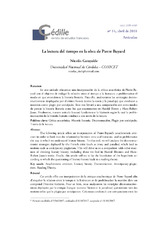Mostrar el registro sencillo del ítem
La lectura del tiempo en la obra de Pierre Bayard
| dc.contributor.author | Garayalde, Nicolás | |
| dc.date.accessioned | 2019-03-28T08:01:54Z | |
| dc.date.available | 2019-03-28T08:01:54Z | |
| dc.date.issued | 2018 | |
| dc.identifier.issn | 1699-4949 | |
| dc.identifier.uri | http://hdl.handle.net/10396/18314 | |
| dc.description.abstract | En este artículo ofrecemos una interpretación de la crítica anacrónica de Pierre Bayard con el objetivo de indagar la relación entre el tiempo y la literatura y problematizar el modo en que entendemos la historia literaria. Para ello, analizaremos las estrategias deconstruccionistas desplegadas por el crítico francés (como la ironía y la paradoja) que conducen a nociones como plagio por anticipado. Esto nos llevará a una comparación con otros modos de pensar la historia literaria como los que encontramos en Harold Bloom y Hans-Robert Jauss. Finalmente, nuestro artículo buscará fundamentar la hipótesis según la cual la problematización de la historia literaria conduce a una teoría de la lectura. | es_ES |
| dc.description.abstract | The following article offers an interpretation of Pierre Bayard’s anachronistic criticism in order to look into the relationship between time and literature, and to problematize the way in which we understand literary history. To that end, we will analyze the deconstructionist strategies deployed by the French critic (such as irony and paradox) which lead to notions such as anticipatory plagiarism. This will drive us to a comparison with other manners of thinking literary history, including those we find in Harold Bloom’s and Hans-Robert Jauss’s works. Finally, this article will try to lay the foundation of the hypothesis according to which the questioning of literary history leads to a reading theory. | es_ES |
| dc.description.abstract | Cet article offre une interprétation de la critique anachronique de Pierre Bayard afin d’enquêter la relation entre le temps et la littérature et de problématiser la manière dont on comprend l’histoire littéraire. Pour ce faire, nous analyserons les stratégies déconstructionnistes déployées par le critique français (comme l’ironie et le paradoxe) qui mènent vers des notions telles que le plagiat par anticipation. Cela nous conduira à une comparaison entre les façons de penser l’histoire littéraire chez des auteurs comme Harold Bloom et Hans-Robert Jauss. Finalement, l’article cherchera à poser les bases de l’hypothèse selon laquelle la problématisation de l’histoire littéraire conduit à une théorie de la lecture. | es_ES |
| dc.format.mimetype | application/pdf | es_ES |
| dc.language.iso | spa | es_ES |
| dc.publisher | UCOPress | es_ES |
| dc.rights | https://creativecommons.org/licenses/by/4.0/ | es_ES |
| dc.source | Çédille 14, 221-243 (2018) | es_ES |
| dc.subject | Crítica anacrónica | es_ES |
| dc.subject | Historia literaria | es_ES |
| dc.subject | Deconstrucción | es_ES |
| dc.subject | Plagio por anticipado | es_ES |
| dc.subject | Teoría de la lectura | es_ES |
| dc.subject | Anachronistic criticism | es_ES |
| dc.subject | Literary history | es_ES |
| dc.subject | Deconstruction | es_ES |
| dc.subject | Anticipatory plagiarism | es_ES |
| dc.subject | Reading Theory | es_ES |
| dc.subject | Critique anachronique | es_ES |
| dc.subject | Histoire littéraire | es_ES |
| dc.subject | Déconstruction | es_ES |
| dc.subject | Plagiat par anticipation | es_ES |
| dc.subject | Théorie de la lectura | es_ES |
| dc.title | La lectura del tiempo en la obra de Pierre Bayard | es_ES |
| dc.type | info:eu-repo/semantics/article | es_ES |
| dc.relation.publisherversion | http://www.uco.es/ucopress/ojs/index.php/ced | es_ES |
| dc.rights.accessRights | info:eu-repo/semantics/openAccess | es_ES |

